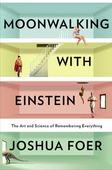|
When I heard the Dean of UCLA Anderson mention Moonwalking with Einstein, I was caught off guard. The title was definitely unusual, and I had no idea what it was about. I knew it was about memory and psychology, and I figured it was worth a shot.
I was definitely in for a treat. The book follows the story of the author, who was a journalist in his twenties and got randomly into the "memory training circuit" and decided to give the techniques a shot by trying to see how well he could improve his memory. He ended up doing quite well: winning the US Memory Championship and making a lot of deep friendships with Mental Athletes (MAs) around the world. The book was a really fun read, and I definitely learned a lot about memory and the history of memory techniques. In addition, I loved the philosophical discussions about the role of memory and how important it is to develop and cherish it for our human nature. It's also inspired me to look into a lot of the primary sources mentioned within it and to perhaps try to train myself similar to how the author did. The only question is when I can find the time to do that.... Below are my main notes on the text. I definitely recommend this book to anyone interested in psychology, memory, and general displays of awesomeness and freakish nature. Ch. 1: The smartest man is hard to find
2 Comments
Sean Amport
6/25/2012 09:30:18 pm
Thanks for the synopsis of the book with notes. I, too, am enjoying the book thoroughly and making notes for myself. Just wanted to say thanks is all.
Reply
Arturo
1/18/2014 11:33:32 am
Nice work! thanks for the notes!
Reply
Your comment will be posted after it is approved.
Leave a Reply. |
Archives
June 2024
Categories
All
Subscribe |

 RSS Feed
RSS Feed
